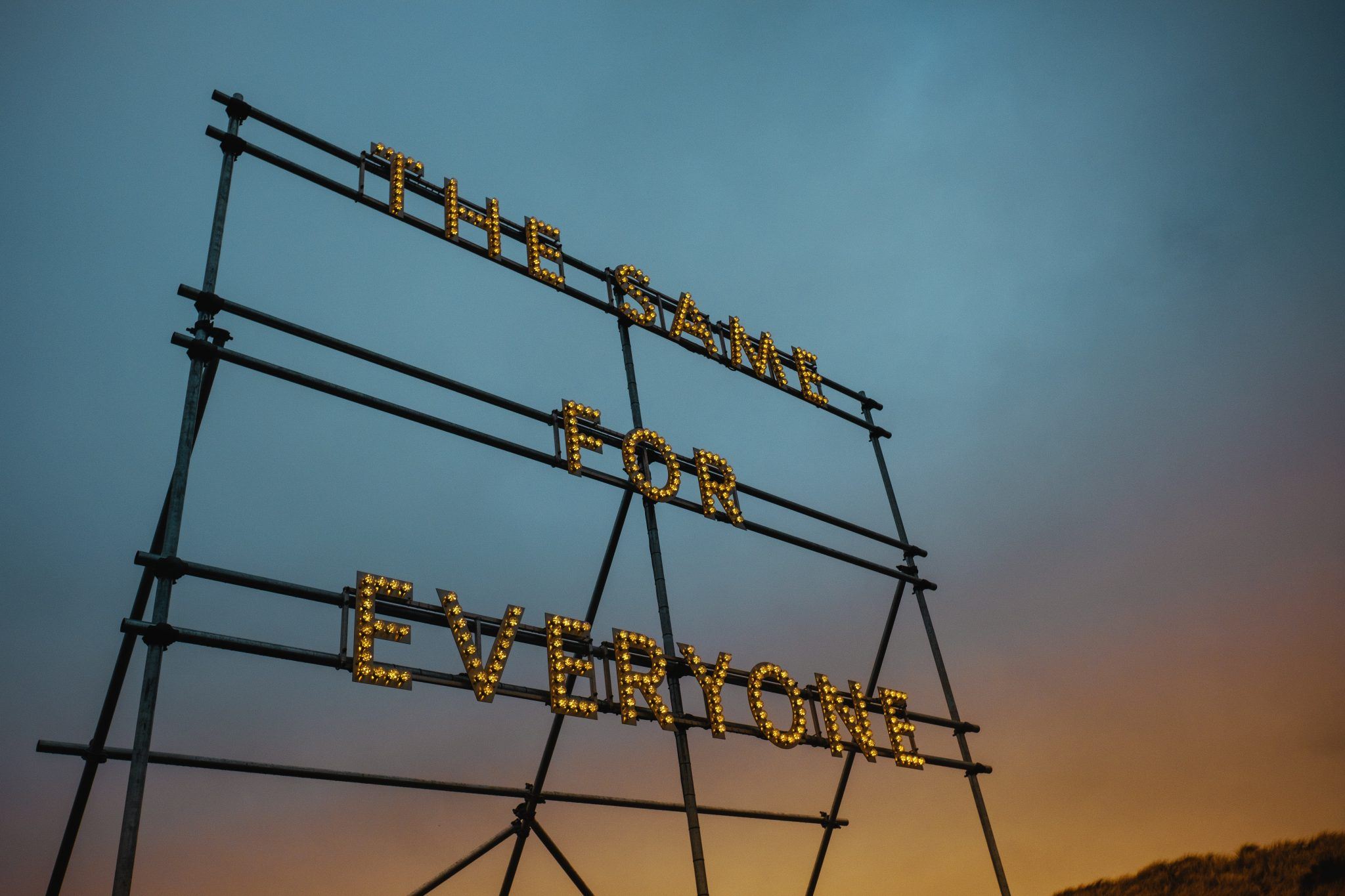We spend a lot of time discussing all the ways in which cannabis has transformed our minds, bodies, and spirits. But what about cannabis equity? Not everyone has access to this magical plant, and those that have been building the industry for decades prior to legalization—primarily people of color—have been unjustly and disproportionately punished by the War on Drugs and even for working in this space.
And that’s exactly why we are taking the time to highlight easy ways you can use your love of the plant to help reduce stigma, expunge cannabis-related sentences, and fight for cannabis equity for all. To get a sense of the bigger picture, we tapped nine leaders in the space from across the country to lend their advice. The biggest takeaways? Do your research and use your dollars to support brands dedicated to equity. Then, use your voice to to demand cannabis reform and cannabis equity for all by speaking up at dispensaries and vocalizing your concerns to your political reps at every level. And for g's sake friends, don't forget to vote. And not just every four years!
Keep reading to discover more easy ways to get involved as well as the brands that will allow you to put your money where your mouth is.
Raeven Duckett, co-founder of Community Gardens Delivery & Distribution
Cannabis consumers have more power in the regulated industry than they realize. Retailers in particular are especially motivated to appease the needs of consumers, so all you should do is start asking questions about the products that retailers carry on their shelves. Ask if any of the brands they carry are run by women of color—the answer will most likely be no, but it's important to communicate that cultural and gender diversity are important to you as a consumer and encourage them to do better.
Christine De La Rosa, co-founder, The People’s Dispensary
The People’s Dispensary tackles inequity in cannabis by ensuring financial inclusion that allows for communities to invest in cannabis, focusing on workforce development where we provide training for every level from entrepreneur to employee, and committing to community reinvestment by giving 10% of our net profit to the communities where the dispensaries reside.
In addition to spending your dollars at businesses like ours, I’d suggest calling your state and federal elected officials to ask how there will be equity one day for people of color, women, and the formerly incarcerated. If they do not have an answer, then you are forcing them to think about these issues, and know you should double-down on your efforts to get involved.
Felicia Carbajal, community engagement director, Smart Pharm Research Group / Cage-Free Cannabis consultant / founding member of Equity First Alliance
Equity First Alliance’s mission is to harness the political power of cannabis organizers that work at the intersection of the cannabis industry, racial equity, and reparative justice. That in and of itself is a revolutionary way of tackling stigma. To date, we have successfully hosted 18 clinics across the country with 298 people receiving services and 3 million dollars of public benefit total.
Getting involved in creating a fair, just and equitable industry starts with supporting grassroots organizations, social equity-owned businesses, and smashing inequities by speaking up with you see them occurring. You can also get involved with Equity First Alliance by donating and signing onto our letter. Additionally, our Los Angeles organizing group meets every Tuesday, and we'd love to see you there!
Jennifer Lujan, director of Social Impact, Eaze
First, educate yourself on how on how the War on Drugs impacted communities, specifically communities of color. Then, dig into the kinds of brands and companies you support with your dollars. Do they support social impact initiatives that are working to repair the negative impacts or a support an underrepresented entrepreneur?
A brand like Bloom Farms, which has always had a 1:1 program where for every product sold, give a meal to a Food Bank. Jerry Extracts, which Eaze partnered with to help deliver free cannabis to terminally ill patients via their Shelter Project are two worthy of support that jump to the top of my mind. Here at Eaze, we have a social impact program that focuses on patient support, economic empowerment, and community sustainability. Most recently, we’ve formed partnerships with the SF AIDS Foundation, supported research related to veterans and cannabis use, and announced a 4/20 partnership with Code for America to help clear 250,000 convictions.
Tyler McFadden, co-founder and Principal, North Star Liberty Group / previously NE political associate at NORML
Although white and black folks consume cannabis at similar rates, much of the country disproportionately arrests and incarcerates black folks for cannabis-related offenses, and Latinx people are also far more likely to suffer disproportionate policing. The best advice I can give is to find businesses owned and operated by people of color (specifically black and Latinx people), patronize those businesses, and encourage your friends and family to do the same. The Minority Cannabis Business Association is a great place to start when you’re looking for brands to support—they're doing great work and have tons of members with great products and brands.
NORML is working toward ending cannabis prohibition across the country, which will largely bring an end to the arrest and incarceration of people in these targeted groups, but we know that alone isn't enough to repair the damage done to impacted communities. With the help and support of our amazing NORML chapters (which are always accepting new members and volunteers) and affiliated activists across the country, we actively advocate for ending barriers of entry into the cannabis industry for those with previous cannabis-related convictions, work with state legislatures to craft and promote expungement language specific to their states.
Kamilah Newton, activist / WPA program graduate
I recently gave a speech about the necessity of sankofa—an African concept that boils down to this: In order to move forward, you have to consult the past. I think this is especially true when it comes to cannabis. Before we make all of this weed free, we need to go and set people free for weed-related offenses. In my mind, I see these people as businessmen who were ahead of their time—we can’t keep them locked up while we are doing this.
Sankofa also applies to my personal story. I spent most of my life knowing that I was going to be a nurse or be in healthcare, but I got kicked out of school after I was arrested. My WPA counselor helped me realize that the thing that drew me in to nursing was advocating for other people. I like to do that because nobody ever advocated for me. WPA’s Women’s Leadership in Media program taught me how to engage with the public and learn to tell my story in the most helpful way possible.
Now I use my voice to speak up about issues like the War on Drugs. I know that it’s not our job to go around convincing everybody, but in the event that someone is really open to learning, tailor the conversation to what best suits you. That could be talking about how your own experiences with cannabis differs from popular portrayal, or showing a documentary, or pulling up a quick Google search to support what you are saying. Always remember that the evidence is out there and the research is on our side!
Torie Marshall, founder, We Baked / Cage-Free Cannabis consultant
I always ask people to think about the cannabis industry before it was an industry. What did it look like? Where I come from, some of that money was given back to the kids and community. With this "new" industry, it just seems for self gain. The rich get richer while the poor continue to get locked up, they can't vote, and they have no opportunity in a field that they created.
How can we support our own? Pro Bono work! Fight to reduce sentencing and fight for automatic expungements. Help those who are released to create a business plan, and remind them that the former customers who watched them get arrested while they were supplying them with medicine now own dispensaries that they can't even work in.
Mary Pryor, co-founder, Cannaclusive
We founded Cannaclusive because cannabis needs to know that inclusivity is a must and is currently a miss within the industry. My co-founders Tonya Rapley-Flash and Charlese Antoinette were tired of being the only melanated bodies in a room full of whiteness and erasure of authentic cannabis culture. My biggest piece of advice is to not buy from or support business or brands that do not have inclusive branding or staff at their companies.
Companies need to create corporate responsibility plans that focus on supporting equity in cannabis with legislation, aligning with community organizations who want to offer education to the masses, including black, Latinx, and various communities of color in hiring processes, having inclusive advisory and executive boards, and giving back percentages of sales towards items that target the War on Drugs. Tell brands that is the reason why you won’t support them. Tell your friends to do the same.
Adam Vine, founder, Cage-Free Cannabis
Cage-Free Cannabis and its nonprofit arm, Cage-Free Repair, help the cannabis industry and its consumers to repair harms of the War on Drugs. We helped launch the first-ever National Expungement Week (N.E.W.) in 2018, which created free events in 15 cities across the U.S. for people to begin clearing their criminal records. We’re busy planning the second N.E.W. for September 2019, and there are plenty of ways for everyone to get involved. I also suggest taking a look at the Equity First Alliance for a list of grassroots cannabis equity and justice organizations around the US that you can get involved with.






